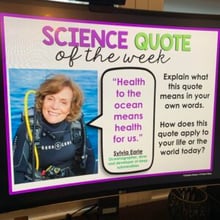Properties of Waves Activities for Middle School Science
The resources below will provide students a comprehensive understanding of the properties of waves. All of the following lessons are also included in the Kesler Science Membership.
The Properties of Waves 5E Lesson includes materials for every "E" phase, including the Properties of Waves Station Lab for Exploration and an interactive PowerPoint with digital INB templates for Explanation.
The lesson also includes introduction materials for Engagement, student-choice project ideas for Elaboration, and assessments for Evaluation.
After completing the Properties of Waves 5E Lesson, students will be able to describe the properties of waves, the three main types of mechanical waves, and how energy and matter interact when waves are created.
The Properties of Waves Inquiry Lab is a hands-on activity that is differentiated for advanced, on-level, and modified middle school students.
Students will construct a simple model of a transverse wave.
The Properties of Waves Inquiry Lab includes a brief reading passage, comprehension checks, hands-on activities, reflection questions, and a CER conclusion.
The Properties of Waves Sub Plan is a complete lesson that takes students through a warm-up, reading passage, independent activity, extension activities, and an assessment.
The worksheets are designed to make your sub day a breeze for you, your students, and the substitute teacher. They are also perfect for distance learning.
Properties of Waves Classroom Experiences
Create a powerful student experience to help solidify students' understanding about the properties of waves. The following experience is also included in the Kesler Science Membership.
Escape Rooms
The Properties of Waves Escape Room is an immersive experience for you students. It allows them to demonstrate their knowledge of light and sound waves in a fun and engaging way.
Students must use what they have learned to identify the properties of a wave. They will also need to know the following vocabulary before playing the game: transparent, translucent, opaque, transverse waves, longitudinal waves, light waves, and sound waves to complete the escape room.
Year-Round Resources
These year-round activities will increase your students' understanding of many middle school science topics. All of these activities are also included in the Kesler Science Membership.
Visual Data & Graphing
You're not alone if your students struggle with understanding graphs, charts, and tables. It's a skill that takes an enormous amount of practice. This resource will help students build a strong foundation in analyzing data and creating their own data visualizations.
Bell Ringers and Warm-Ups
These middle school science bell ringers are an excellent way to engage your students as soon as they walk into your classroom. This comprehensive FULL YEAR resource includes everything you need to start off each science class with an interesting warm-up activity.
Review Board Games
Each game board has been carefully designed to keep students engaged. There are 10 different action spaces on each board and dozens of question cards. All of the actions are related to science concepts and keep the students motivated throughout the game.
Each game is ready to play. Simply print out the board and the cards and let the students enjoy reviewing nine different units.
Essential Questions and Standards
Below are the essential questions and standards associated with the lessons and activities included in the properties of waves unit. This topic is only one of more than 100 middle school science topics included in the Kesler Science Membership.
-
How do matter and energy interact when waves are generated?
-
What are the two main types of mechanical waves?
-
What are the properties of waves?
-
MS PS4-1 - Use mathematical representations to describe a simple model for waves that includes how the amplitude of a wave is related to the energy in a wave
-
MS PS4-2 - Develop and use a model to describe that waves are reflected, absorbed, or transmitted through various materials
-
TEKS Science 8.8 C - Identify how different wavelengths of the electromagnetic spectrum such as visible light and radio waves are used to gain information about components in the universe
Kesler Science Membership
Imagine never having to search for another middle school science lesson again. The membership gives you access to ALL of the Kesler Science products in one place (Yes, including everything above).
Say goodbye to long hours of lesson prep.


